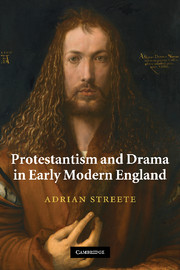Book contents
- Frontmatter
- Contents
- Acknowledgements
- Introduction
- PART I
- PART II
- 5 Anti-drama, anti-church: debating the early modern theatre
- 6 Consummatum est: Calvinist exegesis, mimesis and Doctor Faustus
- 7 Shakespeare on Golgotha: political typology in Richard II
- 8 Mimesis, resistance and iconoclasm: resituating The Revenger's Tragedy
- Afterword
- Notes
- Bibliography
- Index
7 - Shakespeare on Golgotha: political typology in Richard II
Published online by Cambridge University Press: 11 March 2010
- Frontmatter
- Contents
- Acknowledgements
- Introduction
- PART I
- PART II
- 5 Anti-drama, anti-church: debating the early modern theatre
- 6 Consummatum est: Calvinist exegesis, mimesis and Doctor Faustus
- 7 Shakespeare on Golgotha: political typology in Richard II
- 8 Mimesis, resistance and iconoclasm: resituating The Revenger's Tragedy
- Afterword
- Notes
- Bibliography
- Index
Summary
Is any man naturalie born a kinge?
(Christopher Goodman)In studying the Passion we are struck by the role played by quotations from the Old Testament … The early Christians took these references seriously, and the so-called allegorical or figural interpretation in the Middle Ages involved the expansion and appropriate amplification of the New Testament practice. Modern critics generally, and mistakenly, have no interest in this.
(René Girard)If Marlowe was primarily concerned in Doctor Faustus with the interior ramifications of trying to be ‘like’ Christ within the context of related divine and demonological discourses, then Richard II (c. 1595), William Shakespeare's reply to another play by Marlowe, Edward II (c. 1592), examines the political as well as the interior difficulties inherent in pursuing an analogue between a secular ruler and Christ. It is this analogue that I will examine in this chapter. On the face of it, such an approach to the play is not an especially new one. Critics and editors alike have long observed the pervasive presence of Christological rhetoric and imagery in Richard II. Victorian scholars like Henry Reed, Walter Pater and C. H. Herford all commented on the connection between Richard and Christ in the play, and it is one that later informs the editorial work of the first Arden editor of the play, Ivor B. John, who notes in the deposition scene that Richard ‘leaps to a comparison of himself with Christ’.
- Type
- Chapter
- Information
- Protestantism and Drama in Early Modern England , pp. 162 - 199Publisher: Cambridge University PressPrint publication year: 2009



